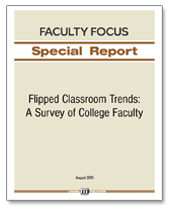There’s an assumption that students arrive at college with some idea of how to study. They have, after all, completed four years of high school prior to their arrival, earning a seat in a college classroom.
Read more ›CURRENT ARTICLE • September 11
OTHER RECENT ARTICLES
Knowing how to handle student complaints is an essential skill for department chairs. In an interview with Academic Leader, Patricia Markunas, chair of the psychology department at Salem State University, offered advice on minimizing the number of complaints and managing those that do make it to the department chair.
Read More ›"I don’t believe in giving students rubrics,” a faculty member told me recently. “They’re another example of something that waters down education.” I was telling him about a study I’d just read that documented some significant improvement in student papers when students used a detailed rubric to guide their preparation of the research paper. I wasn’t very articulate in my response to him and decided I’d use this post to explore some of the issues involved in sharing rubrics and grading criteria with students.
Read More ›Valerie Powell, assistant professor of art at Sam Houston State University, decided to supplement her face-to-face courses to extend the classroom and provide opportunities for students who are not comfortable speaking up in the face-to-face environment. Rather than demanding that students interact using a specific tools, she offers options “to meet students where they are.”
Read More ›Here’s a set of questions about large classes that I’m thinking we ought to be discussing more than we are.
In the 1970s, my mother, a fifth-grade teacher, would lament, “The TV remote has ruined my classroom! I can almost feel the kids trying to point a clicker at me to change the channel!” Little did she know that college students today don’t need to wish for a remote control to switch from their professor to entertainment—an endless assortment of distractions are all on their smart phones.
Read More ›Successfully transferring a face-to-face course to the online learning environment requires careful preparations that take into account differences between these two modalities.
Read More ›I just finished putting together some materials on grading policies for a series of Magna 20-Minute Mentor programs, and I am left with several important take-aways on the powerful role of grading policies. I’m not talking here about the grades themselves, but instead the policies we choose as teachers.
Read More ›Perhaps no other word has been as popular in higher education during the past few years as the term “flipped.” As a result, there is no shortage of ideas and opinions about flipped learning environments. Some faculty consider it another way to talk about student-centered learning. Others view flipped classrooms as an entirely new approach to teaching and learning. Still others see flipping as just another instructional fad that will eventually run its course.
Read More ›Is this situation at all like what you’re experiencing? Class sizes are steadily increasing, students need more opportunities to practice critical thinking skills, and you need to keep the amount of time devoted to grading under control. That was the situation facing a group of molecular biology and biochemistry professors teaching an advanced recombinant DNA course. They designed an interesting assessment alternative that addressed what they were experiencing.
Read More ›








